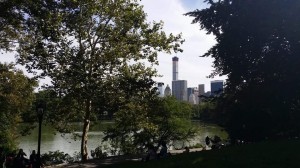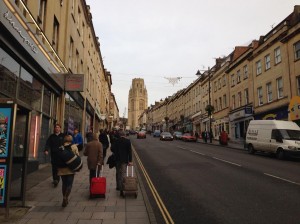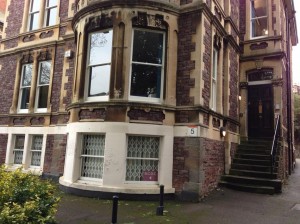by Michelle Taylor @chelle_bluebird
Setting off for TARGs 2013 annual retreat to Cumberland Lodge in Great Windsor Park, I was looking forward to hearing a talk from an invited guest speaker. Gill had flown in from Columbia University to talk to the group about a recent drug administration study her lab group had completed. The research being conducted by their lab was very different to the epidemiological research that I am used to. Now don’t get me wrong, I thoroughly enjoy the research that I do, but these studies sounded new and exciting. After listening to the talk, the evening activities began with dinner and a quiz. Luckily, I ended up on the same quiz team as Gill, giving me the opportunity to ask more about her research. I decided to grab the bull by the horns and offer my help in one of her future studies, and so my trip to the Big Apple began…
 Nine months later I was on my way to Heathrow for a two month stint collecting data on a cannabis administration study. I was both excited and apprehensive. I have never lived more than a 3 hour drive away from family, and have always been in a city where I have known people. I didn’t know whether I would get homesick, or whether I would make friends on my trip abroad. These feelings of apprehension soon disappeared in the first few hours of my first day at the New York Psychiatric Institute. Everyone I met was so friendly and welcoming, even the many morning commuters who stopped to help the lone Brit who was obviously puzzled by the subway map at 7.30am.
Nine months later I was on my way to Heathrow for a two month stint collecting data on a cannabis administration study. I was both excited and apprehensive. I have never lived more than a 3 hour drive away from family, and have always been in a city where I have known people. I didn’t know whether I would get homesick, or whether I would make friends on my trip abroad. These feelings of apprehension soon disappeared in the first few hours of my first day at the New York Psychiatric Institute. Everyone I met was so friendly and welcoming, even the many morning commuters who stopped to help the lone Brit who was obviously puzzled by the subway map at 7.30am.
 I was to spend the next six weeks collecting data for a study examining the neuro-behavioural mechanisms of decisions to smoke cannabis at the Substance Use Research Center in the New York Psychiatric Institute at Columbia University. This research centre is unique; it is one of the largest drug administration centre in the world and has licenses to administer a wide variety of drugs, including cannabis, cocaine and heroin. This means that much of the research conducted here is cutting edge. The aim of the study that I would be working on was to shed light on how and why drug abusers repeatedly make decisions to take drugs despite substantial negative consequences. The study used brain imaging (fMRI) to examine the neural and behavioural processes involved in decisions to self-administer cannabis, compared to decisions to eat food, in regular cannabis users. We also examined the influence of drug and food cues on the processes underlying these decisions. To do this, participants were recruited as inpatients and stayed with us in the lab for a week. Data collection for this study is still ongoing, but I will be sure to write another blog post with what we found when the results are available.
I was to spend the next six weeks collecting data for a study examining the neuro-behavioural mechanisms of decisions to smoke cannabis at the Substance Use Research Center in the New York Psychiatric Institute at Columbia University. This research centre is unique; it is one of the largest drug administration centre in the world and has licenses to administer a wide variety of drugs, including cannabis, cocaine and heroin. This means that much of the research conducted here is cutting edge. The aim of the study that I would be working on was to shed light on how and why drug abusers repeatedly make decisions to take drugs despite substantial negative consequences. The study used brain imaging (fMRI) to examine the neural and behavioural processes involved in decisions to self-administer cannabis, compared to decisions to eat food, in regular cannabis users. We also examined the influence of drug and food cues on the processes underlying these decisions. To do this, participants were recruited as inpatients and stayed with us in the lab for a week. Data collection for this study is still ongoing, but I will be sure to write another blog post with what we found when the results are available.
 I found this research fascinating and it was a pleasure to be involved in the work carried out in this department. The experience was made even more enjoyable by the people I was working with. There were many office conversations about the British and American slang that was being used, many lunchtime trips to Chipotle (an American fast food restaurant that I am definitely missing since my return to the UK), and several Friday evening trips to the local Irish bar. One office memory that will always stick in my mind was meeting a very accomplished researcher in the field of my PhD, a researcher that was definitely someone I should be impressing. Upon entering this individuals office on an extreme
I found this research fascinating and it was a pleasure to be involved in the work carried out in this department. The experience was made even more enjoyable by the people I was working with. There were many office conversations about the British and American slang that was being used, many lunchtime trips to Chipotle (an American fast food restaurant that I am definitely missing since my return to the UK), and several Friday evening trips to the local Irish bar. One office memory that will always stick in my mind was meeting a very accomplished researcher in the field of my PhD, a researcher that was definitely someone I should be impressing. Upon entering this individuals office on an extreme
ly hot New York day, the fan was turned to the meeting area and the smell of cannabis filled the room as the flow of air reached me (I had been administered the drug to a participant earlier that afternoon). Probably not the best first impression I have ever made!
 I did, of course, take every opportunity to explore New York. I was lucky enough to get tickets to watch the New York Yankees beat the Boston Red Sox at the Yankee Stadium, which was also one of the last games played by baseball-legend Derek Jeter. I made several trips to the American Natural History Museum (my favourite type of museum, and this one cannot be done in a day), and while there saw a live spider show, a 3D film about Great White Sharks and a full T-Rex skeleton. The glorious weather allowed for several leisurely strolls around Central Park. And, of course, the American food definitely needs a mention. If anyone reading this takes a trip over the Atlantic, I would definitely recommend visiting Big Daddy’s Diner for what could be the best milkshake on the planet. And don’t be shy about trying a hotdog from one of the carts that can be found on nearly every street corner. The reason there are so many of them is that they’re delicious! I would also recommend a trip to the Russian Tea Rooms for caviar afternoon tea, an evening at the New York Metropolitan Opera (if that’s your cup of tea), and a trip to Coney Island.
I did, of course, take every opportunity to explore New York. I was lucky enough to get tickets to watch the New York Yankees beat the Boston Red Sox at the Yankee Stadium, which was also one of the last games played by baseball-legend Derek Jeter. I made several trips to the American Natural History Museum (my favourite type of museum, and this one cannot be done in a day), and while there saw a live spider show, a 3D film about Great White Sharks and a full T-Rex skeleton. The glorious weather allowed for several leisurely strolls around Central Park. And, of course, the American food definitely needs a mention. If anyone reading this takes a trip over the Atlantic, I would definitely recommend visiting Big Daddy’s Diner for what could be the best milkshake on the planet. And don’t be shy about trying a hotdog from one of the carts that can be found on nearly every street corner. The reason there are so many of them is that they’re delicious! I would also recommend a trip to the Russian Tea Rooms for caviar afternoon tea, an evening at the New York Metropolitan Opera (if that’s your cup of tea), and a trip to Coney Island.
 Although it was daunting going abroad for that length of time to begin with, I don’t think I would be having those feelings again and I would definitely jump at any opportunity to work in a different environment in the future. I am very grateful that I am a PhD student in a large working group like TARG, as without this I probably would not have come across opportunities such as this one. This experience has taught me the importance of inter-disciplinary research, and the need for several fields contributing evidence to a much larger research question. Since this trip, I have been successful in a fellowship application allowing me 9 months in a different department at the University of Bristol, an application that I probably would not have made if it wasn’t for my experience at the Columbia University. I am an epidemiologist and do not have any plans to change that; however I do plan to conduct more interdisciplinary research in the future. I would like to that Gill (and everyone in her lab group) for welcoming me and making this trip possible. I look forward to hopefully working with you again in the future…
Although it was daunting going abroad for that length of time to begin with, I don’t think I would be having those feelings again and I would definitely jump at any opportunity to work in a different environment in the future. I am very grateful that I am a PhD student in a large working group like TARG, as without this I probably would not have come across opportunities such as this one. This experience has taught me the importance of inter-disciplinary research, and the need for several fields contributing evidence to a much larger research question. Since this trip, I have been successful in a fellowship application allowing me 9 months in a different department at the University of Bristol, an application that I probably would not have made if it wasn’t for my experience at the Columbia University. I am an epidemiologist and do not have any plans to change that; however I do plan to conduct more interdisciplinary research in the future. I would like to that Gill (and everyone in her lab group) for welcoming me and making this trip possible. I look forward to hopefully working with you again in the future…



